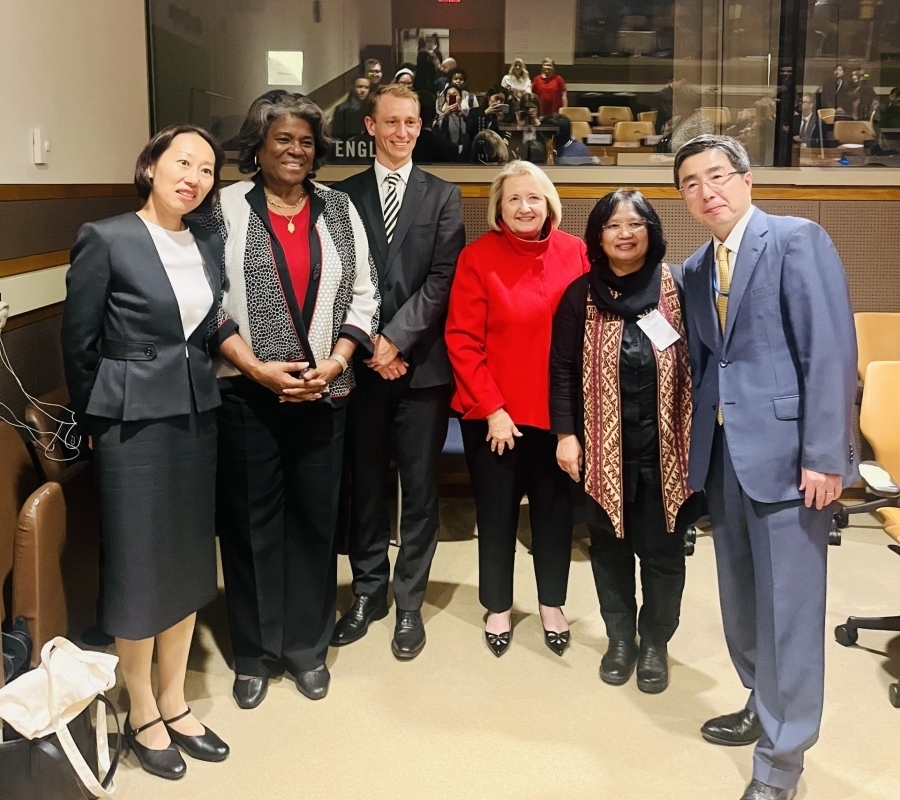Remarks by H.E. Ambassador ISHIKANE, Permanent Representative of Japan to the United Nations, at the event “Engaging Men as Allies in Women, Peace and Security.” Co-hosted by the Permanent Mission of Japan to the United Nations, the United States Mission to the United Nations, the Georgetown Institute for Women, Peace and Security, and the Sasakawa Peace Foundation
2023/10/30

(As delivered)
Distinguished guests,
At the outset I would like to extend my thanks to the Georgetown Institute for Women, Peace and Security, and Ambassador Verveer, and the Sasakawa Peace Foundation for organizing this event, and the United States Mission for co-hosting. I would also like to thank all the participants who are present today.
Japan is pleased to co-host this event on engaging men as allies in Women, Peace and Security.
Although two out of the ten UN Security Council Resolutions related to WPS acknowledge the importance of involving men and boys in WPS initiatives, the majority of WPS efforts do not actively engage with men and boys. On the national level, the engagement of men and boys has always been a component of Japan’s National Action Plans on WPS. Based on the plans, we have supported interventions targeting men as active agents in conflict and post-conflict settings.
Before the briefing on the report, I do not want to disclose too much on the content, but I would like to highlight a few of the key findings that I found interesting with potential policy implications. First, the majority of the men in the study do not associate violence with masculinity and express a desire for different expectations of masculinity. Additionally, women, particularly mothers and wives, play a significant part in shaping expectations of masculinity. These findings clearly show the importance of engaging both genders in the implementation of the WPS agenda.
After concluding the annual Security Council Open Debate on WPS last week, along with a number of related events and discussions throughout this month, I trust that all of you have developed ideas and aspirations for the way forward. I hope that today’s event will provide further opportunity to understand the advantages of integrating a perspective of masculinities into the WPS agenda, and that it will result in tangible and positive impacts on the work of each one of you. I look forward to hearing your feedback, especially from the distinguished representatives from Indonesia and the Philippines, who have joined us today.
I thank you.
⋆The report by Georgetown is now available online
https://giwps.georgetown.edu/resource/beyond-engaging-men/
At the outset I would like to extend my thanks to the Georgetown Institute for Women, Peace and Security, and Ambassador Verveer, and the Sasakawa Peace Foundation for organizing this event, and the United States Mission for co-hosting. I would also like to thank all the participants who are present today.
Japan is pleased to co-host this event on engaging men as allies in Women, Peace and Security.
Although two out of the ten UN Security Council Resolutions related to WPS acknowledge the importance of involving men and boys in WPS initiatives, the majority of WPS efforts do not actively engage with men and boys. On the national level, the engagement of men and boys has always been a component of Japan’s National Action Plans on WPS. Based on the plans, we have supported interventions targeting men as active agents in conflict and post-conflict settings.
Before the briefing on the report, I do not want to disclose too much on the content, but I would like to highlight a few of the key findings that I found interesting with potential policy implications. First, the majority of the men in the study do not associate violence with masculinity and express a desire for different expectations of masculinity. Additionally, women, particularly mothers and wives, play a significant part in shaping expectations of masculinity. These findings clearly show the importance of engaging both genders in the implementation of the WPS agenda.
After concluding the annual Security Council Open Debate on WPS last week, along with a number of related events and discussions throughout this month, I trust that all of you have developed ideas and aspirations for the way forward. I hope that today’s event will provide further opportunity to understand the advantages of integrating a perspective of masculinities into the WPS agenda, and that it will result in tangible and positive impacts on the work of each one of you. I look forward to hearing your feedback, especially from the distinguished representatives from Indonesia and the Philippines, who have joined us today.
I thank you.
⋆The report by Georgetown is now available online
https://giwps.georgetown.edu/resource/beyond-engaging-men/
